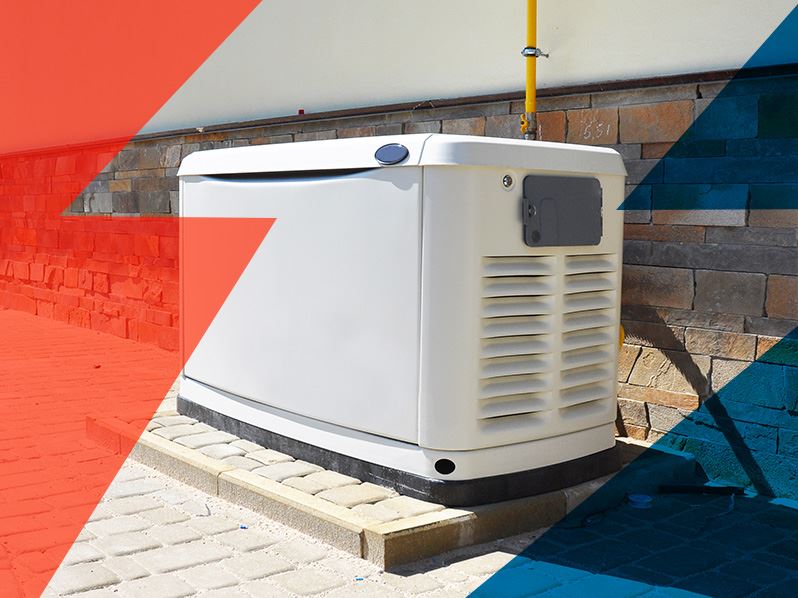Disclosure: This post contains affiliate links and I will be compensated if you make a purchase after clicking through my links. Learn More
A gallon of gas in a generator typically lasts between 3 to 8 hours, depending on the generator’s efficiency and load. This variance hinges on the generator’s make, model, and usage conditions.
Generators are crucial during power outages, outdoor events, or remote job sites. Their efficiency directly impacts fuel consumption, making it essential to understand how long a gallon of gas lasts. Smaller, portable generators usually consume less fuel, providing longer runtime per gallon.

Conversely, larger, more powerful generators may use more fuel, reducing the duration a gallon can last. Knowing your generator’s specific fuel consumption rate helps in planning and optimizing its usage. Regular maintenance and proper load management can also enhance fuel efficiency, ensuring your generator runs longer on each gallon of gas.
Introduction To Generator Fuel Efficiency
Understanding generator fuel efficiency is key to managing energy costs. The efficiency of a generator affects how long a gallon of gas will last. It impacts both the environment and your wallet.
Importance Of Efficiency
Fuel efficiency is crucial for several reasons. First, it determines the operational cost. More efficient generators use less fuel. This leads to lower expenses over time.
Second, fuel efficiency impacts the environment. Efficient generators emit fewer pollutants. This makes them more eco-friendly.
Lastly, fuel efficiency affects the performance of your generator. Efficient generators run longer on the same amount of fuel. This ensures a steady power supply during outages.
Basic Concepts
To understand generator fuel efficiency, you need to know a few basic concepts.
- Fuel Consumption Rate: This measures how much fuel a generator uses over time. It’s usually given in gallons per hour (GPH).
- Load Capacity: This is the amount of power a generator can produce. It’s measured in watts or kilowatts.
- Run Time: This is how long a generator can operate on a full tank of gas. It’s influenced by both fuel consumption and load capacity.
For example, a generator with a fuel consumption rate of 0.5 GPH and a 5-gallon tank will run for 10 hours.
Factors Affecting Fuel Efficiency
Several factors can affect a generator’s fuel efficiency:
- Generator Type: Different types of generators have varying efficiencies.
- Load: The amount of power being drawn affects fuel use.
- Maintenance: Well-maintained generators run more efficiently.
- Fuel Quality: High-quality fuel burns more efficiently.
By understanding these factors, you can better manage your generator’s fuel efficiency.
Factors Affecting Fuel Consumption

Understanding how long a gallon of gas lasts in a generator involves many factors. The most important ones include the load on the generator and the generator’s size and type. Let’s explore these factors in detail.
Load On Generator
The load on the generator plays a big role in fuel consumption. A generator running at full load uses more fuel than one running at half load. For instance, a 5,000-watt generator running at full load will use more gas than the same generator running at 2,500 watts.
Here’s a simple table to illustrate this:
| Load Percentage | Fuel Consumption (gallons/hour) |
|---|---|
| 25% | 0.25 |
| 50% | 0.50 |
| 75% | 0.75 |
| 100% | 1.00 |
Generator Size And Type
The size and type of the generator also affect fuel consumption. Larger generators usually consume more fuel. A 10,000-watt generator uses more gas than a 5,000-watt generator.
Types of generators also matter. Inverter generators are more fuel-efficient. They adjust the engine speed based on the load. This leads to less fuel consumption. Conventional generators run at a constant speed, using more fuel.
- Inverter Generators: Adjust engine speed, more fuel-efficient.
- Conventional Generators: Run at constant speed, less fuel-efficient.
Consider these factors when estimating how long a gallon of gas will last in your generator. Proper understanding helps in effective fuel management.
Estimating Fuel Usage
Understanding how long a gallon of gas lasts in a generator is crucial. It helps manage fuel efficiently and plan for power needs. This section will guide you in estimating fuel usage accurately.
Calculating Runtime
To calculate runtime, know the generator’s fuel consumption rate. This rate is usually specified in gallons per hour (GPH). Check your generator’s manual or specifications for this information.
Use this simple formula:
Runtime (hours) = Gallons of Gas / Fuel Consumption Rate (GPH)For example, if your generator uses 0.5 GPH, one gallon of gas will last:
Runtime = 1 gallon / 0.5 GPH = 2 hoursExamples And Scenarios
Let’s look at some common scenarios:
- Scenario 1: Small Home Generator
- Fuel Consumption Rate: 0.4 GPH
- Runtime: 1 gallon / 0.4 GPH = 2.5 hours
- Scenario 2: Portable Camping Generator
- Fuel Consumption Rate: 0.3 GPH
- Runtime: 1 gallon / 0.3 GPH = 3.3 hours
- Scenario 3: Industrial Generator
- Fuel Consumption Rate: 1.2 GPH
- Runtime: 1 gallon / 1.2 GPH = 0.83 hours
Different generators have different fuel efficiencies. Always refer to your generator’s manual for precise data.
Tips For Maximizing Fuel Efficiency
Maximizing fuel efficiency for your generator is crucial. This can help you save money and ensure your generator runs longer. Below are some actionable tips to help you get the most out of each gallon of gas.
Regular Maintenance
Regular maintenance is essential for optimal generator performance. Follow these maintenance tips:
- Change the oil regularly: Fresh oil ensures smooth engine operation.
- Clean or replace the air filter: A clean filter helps the engine breathe better.
- Inspect the spark plug: A clean spark plug improves ignition.
- Check fuel lines: Ensure there are no leaks or blockages.
Optimal Load Management
Managing the load on your generator can significantly impact its fuel efficiency. Here are some tips for optimal load management:
- Prioritize essential devices: Only run essential appliances.
- Distribute the load: Avoid overloading the generator.
- Use energy-efficient appliances: These consume less power.
- Turn off unused devices: This reduces the load and saves fuel.
| Maintenance Task | Frequency |
|---|---|
| Change Oil | Every 50 hours |
| Clean Air Filter | Every 100 hours |
| Inspect Spark Plug | Every 200 hours |
| Check Fuel Lines | Every 100 hours |
By following these tips, you can maximize your generator’s fuel efficiency. This will help you get the most out of each gallon of gas.
Choosing The Right Generator
When selecting a generator, the type you choose affects fuel efficiency. This ensures you get the most out of every gallon of gas. Let’s explore the differences and considerations.
Portable Vs. Standby
Portable generators are small and easy to move. They are perfect for short-term use. These are great for camping or power outages. They run on gasoline, which is easy to find.
Standby generators are larger and fixed in one place. They are ideal for long-term use. These generators automatically turn on during a power outage. They can run on natural gas or propane, making them more versatile.
| Feature | Portable Generator | Standby Generator |
|---|---|---|
| Size | Small | Large |
| Mobility | Easy to move | Fixed in place |
| Fuel Type | Gasoline | Natural gas or propane |
| Automatic Start | No | Yes |
Fuel Type Considerations
Generators can use different types of fuel. Each type has its pros and cons. Gasoline is common and easy to find. It is perfect for portable generators.
- Natural Gas is cleaner and more efficient.
- Propane is also clean and can be stored for a long time.
Think about the availability and cost of each fuel type. This helps you choose the best generator for your needs.
Impact Of Environmental Conditions
The duration a gallon of gas lasts in a generator depends on many factors. Environmental conditions play a crucial role in determining fuel efficiency. This section explores how temperature and altitude affect generator performance.
Temperature Effects
Temperature can significantly impact a generator’s fuel consumption. Generators run differently in hot and cold climates. In cold weather, engines require more fuel to start and warm up. This can decrease the time a gallon of gas lasts.
On the other hand, high temperatures can lead to overheating. Overheating forces the engine to work harder, consuming more fuel. Therefore, extreme temperatures can reduce fuel efficiency.
Altitude Considerations
Altitude also affects how long a gallon of gas lasts. At higher altitudes, there is less oxygen in the air. Generators need a good mix of air and fuel to run efficiently.
With less oxygen, the engine may consume more fuel to maintain performance. This means a generator will use more gas at higher elevations.
Lower altitudes provide more oxygen, which helps the engine run efficiently. This can extend the duration a gallon of gas lasts.
Innovative Technologies
Generators have evolved with innovative technologies. These advancements help optimize fuel usage. This means a gallon of gas lasts longer. Let’s explore these exciting technologies.
Smart Generators
Smart generators use advanced electronics. They adjust power output based on demand. This ensures fuel isn’t wasted. This technology extends the life of a gallon of gas.
Some features include:
- Automatic load adjustment
- Remote monitoring
- Energy-efficient operations
These features make smart generators highly efficient. They help save both fuel and money.
Eco-friendly Options
Eco-friendly generators focus on reducing emissions. They use cleaner burning technologies. This means they consume fuel more efficiently.
Benefits of eco-friendly generators:
- Lower carbon footprint
- Longer run times per gallon
- Reduced noise levels
These generators often come with eco modes. These modes optimize fuel consumption. Thus, making a gallon of gas last longer.
Our Case Studies
Understanding how long a gallon of gas lasts in a generator can be tricky. Our case studies provide you with valuable insights. Here, we give you examples and show how generators perform in different scenarios. Let’s look at both residential and commercial use cases.
Residential Use
Residential use of generators varies. It often includes small appliances, lights, and heating or cooling devices. A typical home generator might consume 0.5 to 1 gallon per hour.
Consider a small home, like my neighbor’s. During a power outage, their generator ran a fridge, lights, and fans. It consumed 0.75 gallons per hour, meaning a single gallon lasted for about 1 hour and 20 minutes.
Another example comes from my friend’s family. They used a generator to power essential appliances during a hurricane. Their generator used 1 gallon of gas every hour, so a gallon lasted exactly one hour.
Commercial Use
Commercial use of generators involves higher power demands. This includes running computers, machinery, and HVAC systems. Commercial generators generally consume more fuel.
For instance, a small office building in New York used a generator during a blackout. The generator powered computers, lights, and air conditioning. It consumed 2 gallons per hour. Therefore, a gallon of gas lasted only 30 minutes.
In another case, a construction site in California used a generator to power tools and lights. The generator used 1.5 gallons per hour. Thus, each gallon lasted around 40 minutes.
Here is a summary table for quick reference:
Frequently Asked Questions
How Long Will A Gallon Of Gas Last?
A gallon of gas typically lasts 8-12 hours depending on generator size and load.
What Affects A Generator’s Fuel Consumption?
A generator’s fuel consumption is affected by its size, load, and efficiency.
Can Generator Type Impact Gas Usage?
Yes, inverter generators are more fuel-efficient than conventional ones, using less gas.
How To Maximize Generator Fuel Efficiency?
Regular maintenance and running at optimal load can maximize generator fuel efficiency.
Conclusion
Understanding how long a gallon of gas lasts in a generator helps in planning and efficiency. Regular maintenance and using the right generator can maximize fuel efficiency. Remember, factors like load and generator type impact fuel consumption. Always monitor your generator’s performance to ensure optimal use of each gallon of gas.


